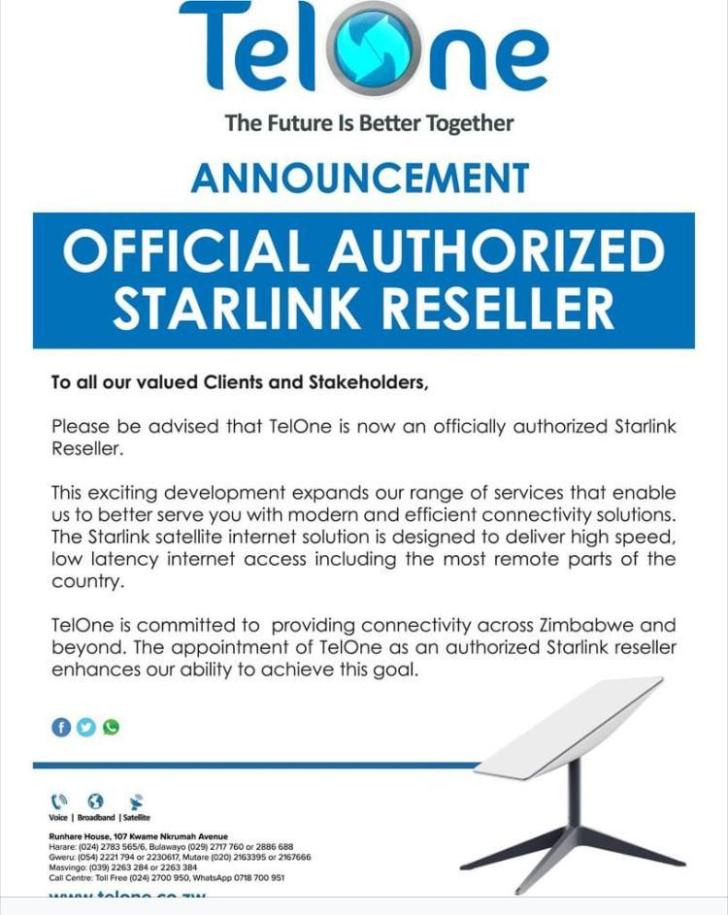News / Local
TelOne jumps on Starlink train
18 Sep 2024 at 14:33hrs |
4 Views

TelOne, one of Zimbabwe's largest fixed internet providers, has announced its partnership with Starlink, becoming an authorized reseller of the satellite internet service. This move comes in response to the recent entry of Elon Musk's SpaceX subsidiary, Starlink, into the Zimbabwean market, which has disrupted the local telecoms industry by offering high-speed, low-latency internet, especially in remote areas.
TelOne, a state-owned company, operates alongside other major players like Econet's Liquid Telecom Zimbabwe, NetOne, and Africom. Rather than directly competing with Starlink, TelOne has opted to collaborate, leveraging Starlink's technology to enhance its service offering. In an official statement shared on social media, TelOne expressed excitement over this partnership, emphasizing that Starlink's satellite internet would allow them to provide improved connectivity solutions across Zimbabwe, including hard-to-reach rural areas.
This collaboration signals a shift in strategy for TelOne, which, along with other internet service providers, is choosing to integrate Starlink's technology rather than face a direct market showdown. By doing so, TelOne aims to capitalize on its existing infrastructure while embracing new technologies.

Other authorized Starlink resellers in Zimbabwe include Aura, a company co-founded by tech entrepreneur Samuelle Dimairho, and Zodsat, another key internet provider. TelOne now joins these local firms in delivering Starlink's satellite services to customers.
Despite this collaboration, competition in Zimbabwe's internet market remains intense. Starlink's entry is expected to draw subscribers away from traditional providers like TelOne and Liquid Telecom, which dominate the market. Liquid Telecom holds 61.1% of the fixed VoIP market share, with Africom trailing at 24.2%. However, the competition will persist, as both traditional and satellite-based providers vie for a growing but limited customer base.
According to the Postal and Telecommunications Regulatory Authority of Zimbabwe (POTRAZ), the first quarter of 2024 saw a contraction in active fixed telephone subscriptions, which dropped by 5.97% to 291,160. This decline further emphasizes the need for local telecom companies to innovate or partner with new players like Starlink to remain competitive in an evolving market.
While TelOne and Starlink now share the same goal of expanding internet access, their rivalry is far from over, as they will continue to compete on service delivery and pricing.
TelOne, a state-owned company, operates alongside other major players like Econet's Liquid Telecom Zimbabwe, NetOne, and Africom. Rather than directly competing with Starlink, TelOne has opted to collaborate, leveraging Starlink's technology to enhance its service offering. In an official statement shared on social media, TelOne expressed excitement over this partnership, emphasizing that Starlink's satellite internet would allow them to provide improved connectivity solutions across Zimbabwe, including hard-to-reach rural areas.
This collaboration signals a shift in strategy for TelOne, which, along with other internet service providers, is choosing to integrate Starlink's technology rather than face a direct market showdown. By doing so, TelOne aims to capitalize on its existing infrastructure while embracing new technologies.

Other authorized Starlink resellers in Zimbabwe include Aura, a company co-founded by tech entrepreneur Samuelle Dimairho, and Zodsat, another key internet provider. TelOne now joins these local firms in delivering Starlink's satellite services to customers.
Despite this collaboration, competition in Zimbabwe's internet market remains intense. Starlink's entry is expected to draw subscribers away from traditional providers like TelOne and Liquid Telecom, which dominate the market. Liquid Telecom holds 61.1% of the fixed VoIP market share, with Africom trailing at 24.2%. However, the competition will persist, as both traditional and satellite-based providers vie for a growing but limited customer base.
According to the Postal and Telecommunications Regulatory Authority of Zimbabwe (POTRAZ), the first quarter of 2024 saw a contraction in active fixed telephone subscriptions, which dropped by 5.97% to 291,160. This decline further emphasizes the need for local telecom companies to innovate or partner with new players like Starlink to remain competitive in an evolving market.
While TelOne and Starlink now share the same goal of expanding internet access, their rivalry is far from over, as they will continue to compete on service delivery and pricing.
Source - online
Join the discussion
Loading comments…































